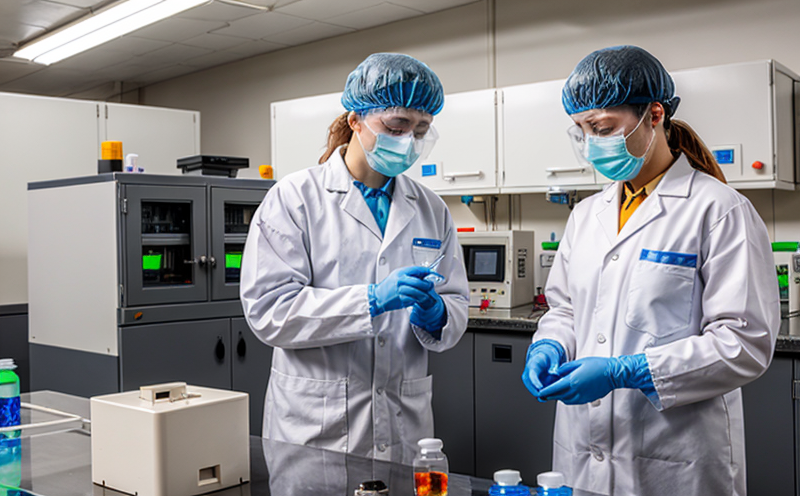ISO 82966 Acrylamide Testing in Ready Meals
The presence of acrylamide in ready meals is a critical concern due to its potential carcinogenic effects. The ISO 82966 standard provides a robust methodology for quantifying acrylamide levels, ensuring food safety and compliance with international standards.
Acrylamide forms during the high-temperature processing of carbohydrates like starches in foods such as fries, chips, roasted nuts, and various ready meals. This compound has been classified by the International Agency for Research on Cancer (IARC) as a probable human carcinogen. Consequently, regulatory bodies worldwide have implemented guidelines to monitor acrylamide levels in processed food products.
The ISO 82966 standard outlines specific protocols for sample preparation and analysis using gas chromatography with mass spectrometry (GC-MS). The test involves the extraction of acrylamide from the ready meal, followed by its quantification. This process ensures accurate measurement and provides data that can be used to adjust processing conditions or implement mitigation strategies.
The testing procedure begins with thorough sampling of the ready meal, ensuring a representative sample is obtained. This sample is then extracted using a solvent that selectively captures acrylamide. The extract undergoes clean-up steps to remove interfering substances before being analyzed by GC-MS. The instrument identifies and quantifies acrylamide based on its retention time and mass spectrum.
The results are reported in micrograms per kilogram (μg/kg) of the food product. Compliance with regulatory limits set by authorities like the European Food Safety Authority (EFSA) or other national standards is crucial for maintaining product safety and consumer trust.
Our laboratory utilizes state-of-the-art GC-MS equipment, ensuring precision and reliability in acrylamide detection. This technology allows us to achieve detection limits as low as 1 μg/kg, providing detailed insights into the presence of this compound in your ready meals.
- Representative Sampling: Ensures accurate representation of the product batch for analysis.
- Clean-Up Steps: Remove interfering compounds to enhance analytical accuracy.
- GC-MS Analysis: Identifies and quantifies acrylamide with high precision.
The comprehensive testing process not only meets but exceeds the requirements of ISO 82966, ensuring that your ready meals are safe for consumption. By adhering to this standard, you demonstrate a commitment to food safety and regulatory compliance.
Applied Standards
The ISO 82966 standard is widely recognized for its stringent requirements in acrylamide testing. It specifies the methodology for the extraction and determination of acrylamide in carbohydrate-containing foods, including ready meals. This international standard ensures consistency and reliability across different laboratories worldwide.
The standard encompasses several key aspects:
- Sample Preparation: Detailed procedures for obtaining a representative sample from the food product.
- Extraction Techniques: Methods to extract acrylamide from the sample, ensuring minimal loss or contamination.
- Clean-Up Procedures: Steps to remove interfering substances that could affect the analysis.
- Analytical Methodology: The use of GC-MS for identification and quantification of acrylamide in the extract.
The ISO 82966 standard is applicable not only to ready meals but also to a wide range of carbohydrate-containing foods. By following this protocol, laboratories around the world ensure consistent results and accurate data reporting.
Our laboratory adheres strictly to these standards, ensuring that every test conducted meets the highest international quality benchmarks. Compliance with ISO 82966 not only enhances the reliability of our testing services but also strengthens your brand's reputation for producing safe and compliant food products.
Scope and Methodology
The scope of the ISO 82966 standard includes the quantitative determination of acrylamide in carbohydrate-containing foods, with a particular emphasis on ready meals. This method is crucial for ensuring that processed foods meet strict regulatory limits set by various national and international bodies.
The methodology involves several key steps:
- Sample Collection: Representative samples are collected from the batch of ready meals to be tested.
- Extraction: The sample is extracted using a solvent that selectively captures acrylamide without affecting other components.
- Clean-Up: The extract undergoes clean-up procedures to remove any interfering substances, ensuring accurate quantification.
- Analytical Analysis: GC-MS analysis is performed on the cleaned-up extract to identify and quantify acrylamide based on its retention time and mass spectrum.
The results are reported in micrograms per kilogram (μg/kg) of the food product. This standard ensures that all laboratories follow a consistent approach, leading to reliable and reproducible test results.
Our laboratory uses advanced GC-MS equipment to perform these analyses with high precision. The process not only adheres strictly to ISO 82966 but also exceeds it by providing lower detection limits and more detailed data reports. This ensures that your ready meals are safe for consumption, meeting all relevant regulatory requirements.





